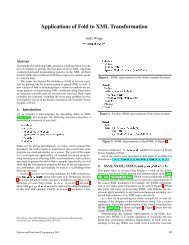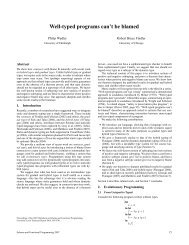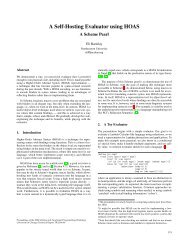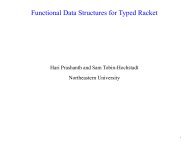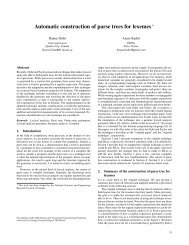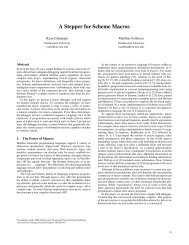2006 Scheme and Functional Programming Papers, University of
2006 Scheme and Functional Programming Papers, University of
2006 Scheme and Functional Programming Papers, University of
You also want an ePaper? Increase the reach of your titles
YUMPU automatically turns print PDFs into web optimized ePapers that Google loves.
struct {<br />
foreign_data *data;<br />
foreign_func cleanup;<br />
} _fd;<br />
Thus, the foreign_data structure contains a pointer to the C heap<br />
region it references, <strong>and</strong> an unsigned double word that can contain<br />
type information, such as the native class identifier <strong>of</strong> the object<br />
being referenced. Within the cell <strong>of</strong> a foreign data object is also<br />
a pointer to a foreign function the garbage collector invokes when<br />
freeing the cell. This allows foreign functions to create instances<br />
<strong>of</strong> C heap objects for use with other foreign functions without<br />
the need for explicit creation <strong>and</strong> destruction by the application<br />
developer. This new type is supported in the same manner as other<br />
Tiny<strong>Scheme</strong> types, with functions available for creating instances<br />
<strong>of</strong> this type as well as testing a cell to see if it contains an instance <strong>of</strong><br />
this type. The display primitive is also extended to display these<br />
objects in a manner similar to the display <strong>of</strong> foreign functions.<br />
The type data that the foreign_data type carries permits developers<br />
to provide type-safe cast functions when accessing C data<br />
in foreign function interfaces. For example:<br />
// Return the class <strong>of</strong> the foreign_data<br />
static __inline AEECLSID<br />
ISCHEMEFFITYPE_GetClass(foreign_data *p) {<br />
return p ? p->clsid : 0;<br />
}<br />
errors from triggering this timer <strong>and</strong> resetting the h<strong>and</strong>set, I add a<br />
similar timing mechanism to Eval_Cycle, as well as a function<br />
scheme_set_eval_max to let Tiny<strong>Scheme</strong> users set the watchdog<br />
timer’s maximum value. If a script runs for longer than the maximum<br />
permitted time, execution is aborted <strong>and</strong> the runtime user<br />
notified with an error indicating that the script could not be completed<br />
<strong>and</strong> the runtime’s state is indeterminate. The RocketBrowser<br />
application sets the maximum script execution time at 500 ms, giving<br />
ample time for simple UI operations <strong>and</strong> a more-than-adequate<br />
ceiling for remaining browser operations during page layout <strong>and</strong><br />
drawing.<br />
With all <strong>of</strong> this in place, extensions to the Tiny<strong>Scheme</strong> interpreter<br />
could be written as st<strong>and</strong>-alone BREW extensions implementing<br />
the I<strong>Scheme</strong>FFP interface, making dynamic loading <strong>of</strong><br />
extensions to the Tiny<strong>Scheme</strong> runtime possible.<br />
// return whether this foreign_data is<br />
// <strong>of</strong> the desired class<br />
static __inline boolean<br />
ISCHEMEFFITYPE_IsInstanceOf(foreign_data *p,<br />
AEECLSID cls) {<br />
return (boolean)(p && p->clsid == cls);<br />
}<br />
// Return a typeless pointer to the data<br />
// contained by a foreign_data<br />
static __inline void *<br />
ISCHEMEFFITYPE_GetData(foreign_data *p) {<br />
return p ? p->p : NULL;<br />
}<br />
static __inline IShell *<br />
ISCHEMEFFPTYPE_GetShell(foreign_data *p) {<br />
return<br />
ISCHEMEFFITYPE_IsInstanceOf(p, AEECLSID_SHELL) ?<br />
(IShell *)ISCHEMEFFITYPE_GetData(p) : NULL;<br />
}<br />
Using inline functions such as ISCHEMEFFITYPE_GetShell to<br />
ensure type-safe access to foreign_data wrapped data at the C<br />
layer is unfortunately a manual approach. Because developers can<br />
at any time circumvent this type-safety by accessing the contents <strong>of</strong><br />
a foreign_data item directly, it must be enforced by convention<br />
<strong>and</strong> inspection.<br />
The foreign_data type is also used with foreign functions<br />
in this implementation. When defining foreign functions with the<br />
interpreter, the developer can also register a foreign_data object<br />
<strong>and</strong> its associated destructor. This lets foreign functions keep<br />
state without needing to directly modify the Tiny<strong>Scheme</strong> context<br />
struct scheme.<br />
Wireless terminals typically provide a watchdog timer, so that<br />
a rogue application cannot lock the h<strong>and</strong>set indefinitely <strong>and</strong> prevent<br />
its use as a telephone. If application execution continues until<br />
the watchdog timer fires (typically two seconds), the h<strong>and</strong>set reboots,<br />
terminating the rogue application. To avoid erroneous script<br />
<strong>Scheme</strong> <strong>and</strong> <strong>Functional</strong> <strong>Programming</strong>, <strong>2006</strong> 155




